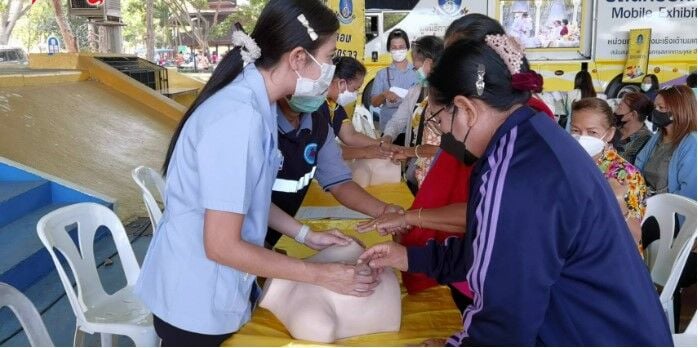Pattaya: Women queue up for breast cancer screening in Nong Prue

Scores of female residents in Nong Prue, Pattaya, descended upon the Municipal Dome for a mobile breast cancer screening.
A state-of-the-art mobile mammography unit, strategically designed to zero in on women in high-risk and underserved communities was unveiled in the district.
Kitti Boonratananet, the Public Health Officer of Banglamung District, hailed the inaugural screening day as a triumph, drawing in a whopping 250 participants, mainly from targeted and at-risk groups. A blend of local publicity and online advertisement via platforms like LINE groups spearheaded by government bodies attracted the targeted locals.
However, the euphoria surrounding the event is shadowed by a pressing reality: the urgent need for widespread participation in these screenings. Despite the positive turnout, there looms a dangerous hesitation among some individuals to undergo screenings, potentially fuelling a spike in mortality rates.
Early detection, with a commendable 70% success rate, remains the strongest ally against breast cancer, the leading cause of death among Thai women, reported Pattaya Mail.
In 2022, Chon Buri Cancer Hospital and Chon Buri Hospital sounded the alarm on new breast cancer cases, with 710 patients desperately seeking treatment. Doctors solemnly revealed that late-stage diagnoses often sprouted from tardy medical consultations, unleashing more aggressive and far-reaching conditions.
“The success of this event shouldn’t breed complacency. We need a collective push for proactive screenings. The stakes are high, with breast cancer tightening its grip on our community.”
In related news, the National Health Security Office (NHSO) of Thailand announced in August last year that breast cancer screenings would be available to all Thai citizens insured under any healthcare scheme, conditional on certain criteria.
Deputy Secretary-General of NHSO, Attaporn Limpanyalert, emphasised the critical need for preventive healthcare measures in combatting the disease. This move comes as an extension of the existing provisions within the 30-baht universal healthcare package, otherwise known as the gold card scheme.
Latest Thailand News
Follow The Thaiger on Google News:


























